 Petzlover
Petzlover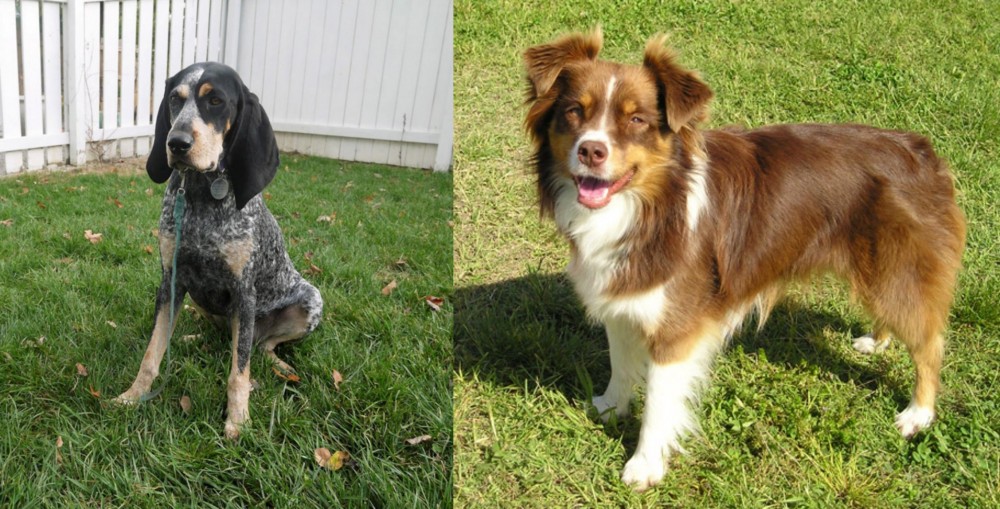 Grand Bleu de Gascogne is originated from France but Miniature Australian Shepherd is originated from United States. Grand Bleu de Gascogne may grow 26 cm / 11 inches higher than Miniature Australian Shepherd. Grand Bleu de Gascogne may weigh 26 kg / 58 pounds more than Miniature Australian Shepherd. Both Grand Bleu de Gascogne and Miniature Australian Shepherd has almost same life span. Both Grand Bleu de Gascogne and Miniature Australian Shepherd has almost same litter size. Grand Bleu de Gascogne requires Low Maintenance. But Miniature Australian Shepherd requires Moderate Maintenance
Grand Bleu de Gascogne is originated from France but Miniature Australian Shepherd is originated from United States. Grand Bleu de Gascogne may grow 26 cm / 11 inches higher than Miniature Australian Shepherd. Grand Bleu de Gascogne may weigh 26 kg / 58 pounds more than Miniature Australian Shepherd. Both Grand Bleu de Gascogne and Miniature Australian Shepherd has almost same life span. Both Grand Bleu de Gascogne and Miniature Australian Shepherd has almost same litter size. Grand Bleu de Gascogne requires Low Maintenance. But Miniature Australian Shepherd requires Moderate Maintenance
 The Grande Bleu de Gascogne is a dog which has descended from a line of French hounds. Originating in France, the dog is actually more common in the United States than in France.
The Grande Bleu de Gascogne is a dog which has descended from a line of French hounds. Originating in France, the dog is actually more common in the United States than in France.
They were bred to hunt, and today they continue to be used for hunting, but they double up as loyal pets too.
It is believed that they descended from dogs such as the St. Hubert Hound and the English Southern Hound. The dog itself has had an influence on the development of several scent-hound breeds.
In the United States, the Grande Bleu de Gascogne was bred in the 18th century already, displaying typical pack hound behavior.The dog isn't recognized by the AKC but he is recognized by other kennel clubs as a scenthound.
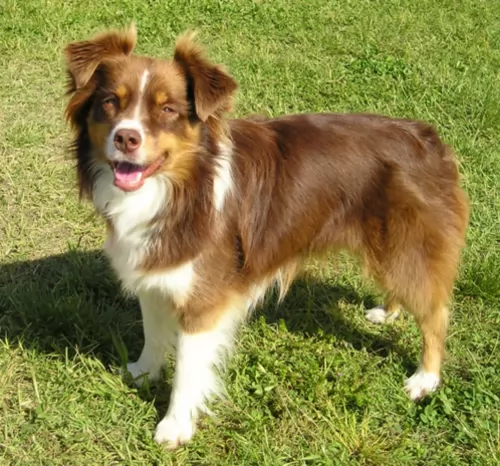 Unlike some miniaturized pure dog breeds, the Miniature Australian Shepherd is a breed of its own. The American Kennel Club and the United Kennel Club recognize that the miniature Australian Shepherd is the same as the miniature American Shepherd.
Unlike some miniaturized pure dog breeds, the Miniature Australian Shepherd is a breed of its own. The American Kennel Club and the United Kennel Club recognize that the miniature Australian Shepherd is the same as the miniature American Shepherd.
Certain breeding programs to develop the Miniature Australian Shepherd have been established and this dog is a small version of the Australian Shepherd. You can say that the Mini Australian Shepherd was developed in the 1960s and hails from the USA. American ranchers bred small Australian Shepherd dogs to create smaller replicas of the breed.
 The Grand Bleu de Gascogne is a large dog, standing at 65–72cm with the female usually being slightly smaller at 62–68cm. The dog weighs about 36 to 42kg.
The Grand Bleu de Gascogne is a large dog, standing at 65–72cm with the female usually being slightly smaller at 62–68cm. The dog weighs about 36 to 42kg.
He has a lean, muscular body with long legs, long ears and with a strong, noble appearance. The coat is short and smooth and the color of the coat is white and black mottled. In some instances, there'll be large patches of black over the back of the dog. The head and neck area can also be black. There are tan markings above each eye.
This is a gentle dog, not aggressive at all, and he just wants to get on with hunting. He is a social dog and loves to be around other familiar dogs and his human family. He essentially wants to live in the country where he can be busy and active with tasks to do.
If you leave him alone for too long, he becomes frustrated and resorts to baying. He can get on well with adults and children in the home, but tends to be aloof around strangers. He is an intelligent animal, and training and socialization will be important for him, especially since he is independent and likes doing things his way.
The training will make him obedient and he'll always know how to behave well around strangers.
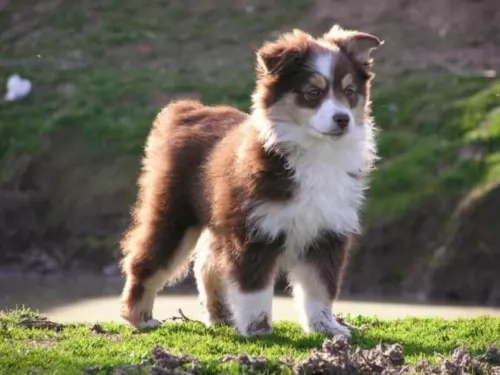 The Miniature Australian Shepherd’s coat is medium-length and is straight or wavy. It comes in a range of colors such as blue or red merle and red or black tricolor. There are white or tan markings as well. He is a small dog, standing at 33 - 46 cm in height and weighing 6 – 16kg.
The Miniature Australian Shepherd’s coat is medium-length and is straight or wavy. It comes in a range of colors such as blue or red merle and red or black tricolor. There are white or tan markings as well. He is a small dog, standing at 33 - 46 cm in height and weighing 6 – 16kg.
They have blue or brown eyes but some will even have one eye blue and the other brown. The ears are semi erect, semi floppy and the tail, while essentially left long and feathery, is sometimes docked.
Miniature Australian Shepherds are easygoing dogs who love being with their human families. They get on well with children in the home and are always willing to jump right in for a game.
They’re lively and agile and if its not games they’re busy with, they want to be on a walk. They’re loving and loyal and also eager to please, sensing what their owner wants.
They’re intelligent dogs too and easy to train so it is sure to go well with training and socialization, which is important for any dog. This training and socialization can actually help with problems a dog has such as being very nervous or being too active indoors. They become obedient and manageable wherever they are.
He is also willing to get on with other pets in the house. Just like the larger dog, the mini Australian Shepherd loves to be active and at work.
 Your beautiful hunting dog is active and social and just loves to be out and about following a scent with other hunting dogs. This is what he absolutely loves to do.
Your beautiful hunting dog is active and social and just loves to be out and about following a scent with other hunting dogs. This is what he absolutely loves to do.
These days, apart from just hunting, he is also kept as a pet. He makes a good family companion because he is a non aggressive, gentle, even-tempered pet. Some of these dogs tend to be more reserved in nature. However your dog turns out, he can be your special friend when you give him all the exercise, nutrition and love that such a loyal dog deserves.
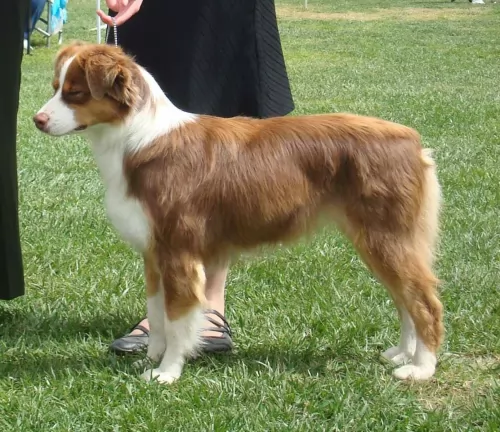 The wonderful friendly nature’s of these dogs make them excellent family pets, especially when they have been trained and socialized. They can live in the city or country but they will certainly require being exercised as they are an active breed, wanting to be busy with his human family.
The wonderful friendly nature’s of these dogs make them excellent family pets, especially when they have been trained and socialized. They can live in the city or country but they will certainly require being exercised as they are an active breed, wanting to be busy with his human family.
You can’t describe these dogs as low maintenance as they have long, thick hair that sheds and which will also need to be brushed regularly.
If you’re able to provide a good home for this beautiful, lively dog, then he will make you a splendid pet.
 As a dog not known for inherited health problems, the Grande Bleu de Gascogne, with good care, can live to be 12 years of age.
As a dog not known for inherited health problems, the Grande Bleu de Gascogne, with good care, can live to be 12 years of age.
Just like with other dog breeds, there are some conditions to which this dog may also be prone, and hip dysplasia is one.
The average litter size for the Grande Bleu de Gascogne is 4 to 7 puppies. It is important to prevent your puppy growing too quickly because this is precisely what leads to musculoskeletal problems as an adult.
If you're concerned about this, speak to your vet, as you want to do your best to prevent hip problems in the future.
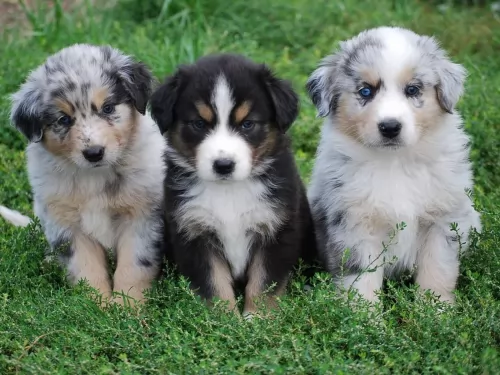 Your Miniature Australian Shepherd can enjoy good health if you make sure he has a nutritious diet, he is well exercised and he is happy and content because of the attention you give him. He can easily reach 13 years of age.
Your Miniature Australian Shepherd can enjoy good health if you make sure he has a nutritious diet, he is well exercised and he is happy and content because of the attention you give him. He can easily reach 13 years of age.
Also, say what you like, human beings constantly tampering with animals to produce certain looks has its drawbacks and can create health problems in dogs.
As a pure breed however, these dogs will be more susceptible to some common canine health problems such as hypothyroidism, patellar luxation, obesity, hip dysplasia, vision problems and cancer.
 Known for his hunting skills, the Grande Bleu de Gascogne has high exercise requirements. Although a walk is wonderful for him, it won't be enough. If you have a large garden, which will be ideal for him, throw the ball so he can fetch it. If you go cycling or jogging, he'll thank you for including him in these.
Known for his hunting skills, the Grande Bleu de Gascogne has high exercise requirements. Although a walk is wonderful for him, it won't be enough. If you have a large garden, which will be ideal for him, throw the ball so he can fetch it. If you go cycling or jogging, he'll thank you for including him in these.
The Grand Bleu’s short coat is conveniently low maintenance too so you aren't going to be spending anything on professional grooming. Give him a brush twice a week to remove loose hairs and to keep his coat silky and shiny.
Their long ears should be checked regularly for a build up of wax and dirt. Dampness can also be a problem if he loves to go swimming. You can buy special ear-cleaning-for-dog products. Never probe deep in the ears as you can damage them. Rather get advice from your vet or professional groomers on how to keep the inside of his ears clean and free from infection.
An energetic hunting scentdog like this requires high quality food with some raw meat added in from time to time. He must always have access to fresh, cool water.
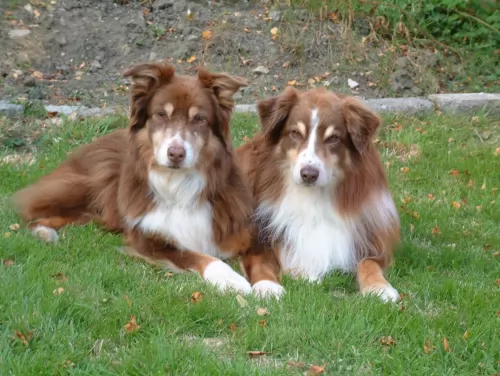 The mini Australian Shepherd has a long coat with seasonal shedding. You will need to give the coat a good brush twice a week to keep it untangled and to remove loose hair.
The mini Australian Shepherd has a long coat with seasonal shedding. You will need to give the coat a good brush twice a week to keep it untangled and to remove loose hair.
Other grooming for your pet will be to check his eyes and ears for infection, check for unusual lumps when you brush him and check for fleas and ticks. Keep his nails trimmed and brush his teeth 2 or 3 times a week to avoid plaque build up.
If you’re wondering how to keep your dog well groomed for the enhancement of this health, people such as your vet or professional groomers will do these grooming tasks for you.
Top quality commercially manufactured dog food packed with vitamins and minerals needs to be your choice if you're going to be using these dog foods. Avoid the cheaper brands that use lots of fillers, sugar, salt, colorants and preservatives.
Home-made food is a wonderful treat for a dog and delicious, nutritious and simple ingredients such as boiled chicken, brown rice or pasta and some cooked vegetables chopped up into his dry kibble from time to time will do him wonders.
Sometimes it will also be good to add in a little bit of raw meat too. Make sure there is a bowl of fresh, cool water available to your pet constantly.